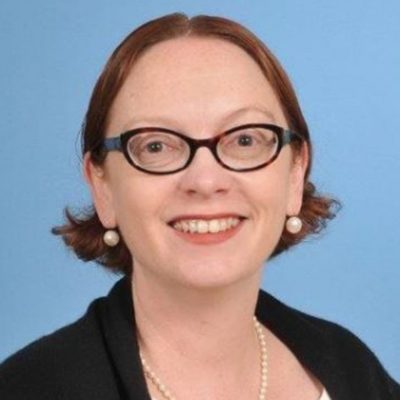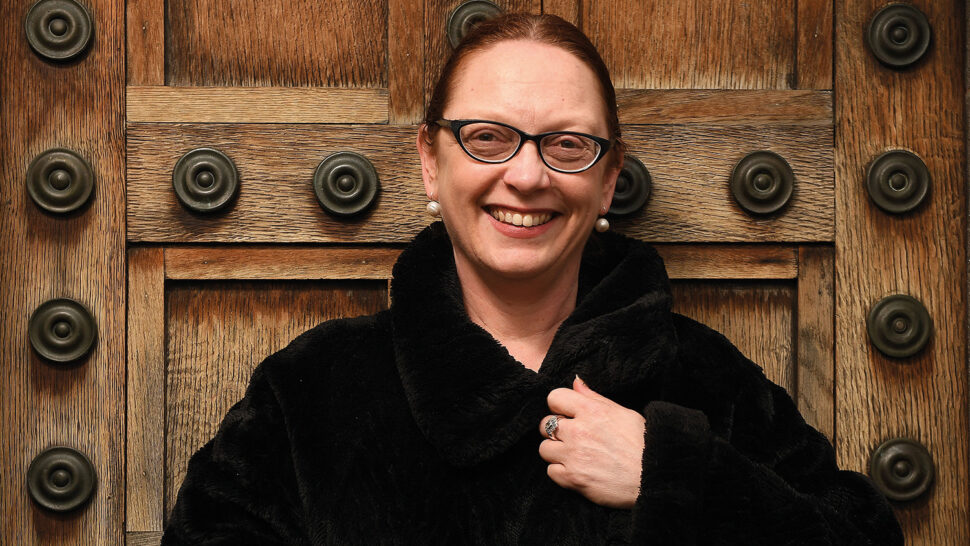The Confederation of School Trusts leader Leora Cruddas tells how teaching in apartheid-era South Africa forged her determination to improve the lot of all children
Leora Cruddas opens our conversation by telling me she hates talking about herself and is nervous about the thought of a profile piece.
Such apparent shyness seems misplaced for someone who has achieved such a successful career – from teaching in a South African township to leading the Confederation of School Trusts.
But it does align with Cruddas’ modus operandi at the influential membership body for academy trusts where, under the previous government, she preferred to quietly influence.
Being bolder
Cruddas says she believes “ministers respect you if you air particularly strong disagreements quietly first” and don’t “shout in the press”.
But the approach has caused problems. Particularly towards the end of the Conservatives’ time in office, some felt that CST wasn’t critical enough.
“We will be bolder publicly than we have been before,” says Cruddas, pointing out that because CST now represents more than three quarters of all academies, it has a “huge amount of authority to speak to government on behalf of the trust sector”.
That’s quite an emergence in just six years since the body was founded.
But how do you represent the views of such a huge range of leaders, whose trusts range from one school to more than 90?
Has Cruddas found the right balance? “Gosh, no”, she responds. “It’s a perennial challenge”.
And is there an element of also having to manage egos? Cruddas says she takes the approach of leading “with humility”.
“I never forget that my authority and our authority as CST comes from our members,” she adds.
“This is nothing to do with personal importance or positional power. It is about remembering every day, the trust we hold with children.”
One issue the body has been increasingly vocal about is education’s SEND crisis.
Labour has faced criticism for an apparent lack of urgency on the issue.
But Cruddas cautions that it’s still “early days” for the new government and not helpful to criticise yet – arguing the new team will need time to understand the issues and work out how to respond.

School segregation
Cruddas values democracy. She was raised in apartheid-era South Africa where she fiercely opposed how schools were segregated by skin colour.
Cruddas was head girl at her all-white school (“for my sins”) and trained as an English teacher after studying English literature at university in Johannesburg.
She still thinks of herself as an English teacher “first and foremost”, admitting it’s a “huge part” of her professional identity.
But rather than teach in the segregated state school system she detested, Cruddas took up a post in an NGO-funded school.
Non-white groups typically lived in overcrowded townships on the outskirts of cities, and Cruddas’s school was in a community hall in the township of Alexandra – then one of the country’s poorest.
Residents faced “poverty we would find difficult to imagine here”, with many living in homes with no running water or electricity.
Much of what she believes today about education policy is a consequence of those experiences.
Cruddas believes that when we talk about “economically under-resourced communities, we need to respect that they can still be hugely rich in their cultural traditions”.
Alexandra was where the poet Mongane Wally Serote and author Mark Mathabane grew up, and African jazz was “core” to people’s lives.
Cruddas’ views on the “right of every child to a knowledge-rich curriculum” come not from the American educational theorist E.D. Hirsch or English policy debates, but from seeing black children denied such an experience.
She also has a passionate belief in the “need to undo the conflation between social mobility and social justice”. Whereas social mobility entails “lifting up a few”, Cruddas wants a just education system that “lifts up all children”.

Austerity cutbacks
Whilst teaching, Cruddas took an English literature master’s degree, intending to forge a career in academia. But her school closed when international organisations withdrew funding as apartheid ended.
Instead, she ventured to London in 1996 on a programme that recruited teachers from overseas.
She taught children with special needs in Newham, East London, then an “international beacon in what inclusive education looked like”, before being seconded to the area’s local authority as a SEND adviser.
She criticises the “predominant policy discourse” around SEND children, both then and now, as “based on an over-medicalised deficit model”.
“We have literally not moved on at all,” she says.
Cruddas then spent the next decade working for various London local authorities where she realised the issue with councils running schools was it is “not their only job”, adding “our children’s education is so important it really does need a specialist vehicle with specialist governance”.
She compares schools to GP surgeries in this respect, arguing: “We wouldn’t think it a good idea for local authorities to maintain GP surgeries, would we?”
Her time with councils came as the austerity axe fell on local government.
Cruddas was being forced to make cuts to youth services, educational psychology, school improvement schemes, SEND and music services.
“That’s not why I came into education,” she adds, saying cutbacks went “too far and weren’t strategic”.
At the time she wanted ministers to look into “renegotiating the social contract” so councils could be “clear with our residents what we were responsible for delivering”. She’s disappointed that this dialogue “still hasn’t happened”.
But her next job was one she “really loved”. As director of policy and public affairs for the Association of School and College Leaders (ASCL), in 2015 Cruddas led the production of its first blueprint for a self-improving system.
It reflects her strong belief that “it’s easy to get angry with the government about what we stand against, but then you also have a responsibility to say what you stand for”.
The paper presents a vision of the education system in 2020, with all schools having moved “away from prescription to a profession-led system”, but required to join multi-academy trusts or federations.

Confederation of School Trusts is born
It was during her last 18 months at ASCL that Cruddas realised the government lacked a “good way” to engage with the newly-emerging academy trust sector, beyond approaching “a few favoured CEOs”.
She left ASCL in 2017, initially to lead CST’s predecessor organisation Freedom and Autonomy for Schools – National Association (Fasna), which aimed to “promote and secure autonomy for schools”.
It folded when CST launched the following year. Instead, CST had three “strategic anchors”: to advocate, connect and support the sector.
During the pandemic the body became a lifeline for many trusts – struggling under a tide of new rules, guidance and the sheer difficulty of continuing to provide an education to pupils.
Cruddas pivoted the body to become “entirely member facing. I did very little else in that period other than serve my members”.
She started member briefings and weekly Wednesday morning meetings, which still continue now.
During Covid she would ask her members what they needed from government. But she says calls were also therapeutic for leaders, many of whom felt isolated during that period.
They gained “a sense of community” in hearing from others who were dealing with the same novel leadership challenges.
Cruddas adds: “We were all learning how to do risk assessments and stand up testing sites together. And because we were dealing with it together, it felt safer than just trying to do it on our own.”

Pride and regrets
Eight weeks before the pandemic, Cruddas wrote a paper, The three nested narratives of leadership, on the topic of civic and trust leadership. It proved timely as civic leadership had risen to the forefront during Covid.
The paper now forms part of the wider “CST canon” that Cruddas is particularly proud of.
She says the organisation’s “think pieces” have “helped the sector develop a new narrative for itself, away from the anti-academies narrative of privatisation and much more about civic leadership”.
Another career highlight was collecting her CBE in 2022. She flew her “hugely proud” mum over from South Africa. “It was a big thing for her, more so I think than for me.”
But there are also regrets, particularly over being able to shift the last government’s view on certain issues.
Her deepest regret was failing to stop plans for minimum strike levels in schools, but Labour has since committed to scrapping the policy.
Cruddas says the rules were “undermining that fundamental principle of our democracy – the right to withhold labour”
Meanwhile, with regard to the new government, she says Labour “understand” the economic argument for investment in schools as it “directly supports” the party’s mission to break down barriers to opportunity.

At the top of her wish-list is “the eradication of child poverty, without any shadow of a doubt”.
Labour has set up a cross-government child poverty taskforce.
She says: “If this government can lift children out of poverty in the next five years I would certainly be delighted, but I think all my members would as well.”
Regional school improvement teams
But a change Cruddas is perhaps less keen on is Labour’s introduction of regional school improvement teams next year to intervene in struggling schools.
Intervention will take place before a decision is made on whether to academise a school, which suggests that should a school get back on track there will be no need for what are sometimes expensive and drawn-out academy conversions.
Cruddas says “there are other ways to secure improvement” in struggling maintained schools.
However, she still believes that being part of “a group of schools working together in a legal entity” is “the only secure, long-term, sustained improvement”.
But what about federalisation as an alternative to academising?
Cruddas says she “would love to disrupt this idea that ‘we have to resist joining a trust’.
“If we really believe in deep and purposeful collaboration, why would we seek to resist? It’s political in the end, isn’t it?”
But she adds: “I hate the term [academisation], I don’t even know what it means.
“I believe in the power of a group of schools working together in a single legal entity. We call that an academy trust. That is the most powerful educational structure for schools and for children.”











